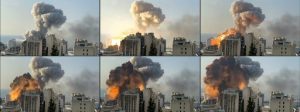Tuesday’s massive explosion in Beirut is still reverberating around the beleaguered Mediterranean nation as anger grows over the apparent negligence and corruption that facilitated the ruinous blast, like reported by newsweek.com.
The ammonium nitrate that exploded in the port of Beirut had been left on site for six years, despite repeated warnings that it posed a huge risk to the densely populated city.
As Beirutis mourn the dead, search for the missing and clear the debris-filled city streets, their anger is once again falling on the political elite that has long been unable to deliver desperately needed reforms and progress while enriching themselves and their affiliates.
One of the most powerful political factions is Hezbollah—the Iranian-backed Islamist political party-cum-militia the effectively controls the south of Lebanon. The party wields massive influence in the country and effectively operates as a state within a state, even fighting its own wars with Israel to the south.
On Thursday, French President Emmanuel Macron became the first foreign leader to visit devastated Beirut since the explosion. Met in the street by locals appealing for help, the French leader used his visit to urge Hezbollah and other political groups to end the lethargy and prevarication that has come to define Lebanese politics.
“If reforms are not carried out, Lebanon will continue to sink,” Macron said, according to Reuters. “What is also needed here is political change. This explosion should be the start of a new era.”
The French president promised to organize an international aid conference to seek funds to support Lebanon, telling locals: “I guarantee you, this aid will not go to corrupt hands.” Macron also vowed to deliver difficult “home truths” to Lebanon’s leaders and push for more “transparent governance.”
Macron addressed Hezbollah directly, calling on the group to prioritize the needs of Lebanese rather than its Iranian backers. “If they defend the interests of the Lebanese people, let them find a solution to electricity and to the problems of the people instead of serving the interests of a foreign country,” he said, according to Al-Masdar News.
Hezbollah has been behind multiple major terrorist attacks both in Lebanon and abroad. This includes the 1983 Beirut barracks bombings, which killed 241 U.S. military personnel.
Its political and military wings are considered terrorist organizations in nations including the U.S., the U.K, Germany, Canada and Israel. The European Union considers Hezbollah’s military wing a terrorist organization.
The group has been a major target for President Donald Trump’s administration, which has accused Hezbollah of nefarious activity across the Middle East, in Europe and as far away as South America.
Hezbollah’s affiliation with Iran makes it a natural enemy of Saudi Arabia—the Sunni Muslim totalitarian monarchy that has battled Tehran for regional supremacy for decades. Soon after the Beirut explosion, Saudi-linked social media accounts began peddling conspiracy theories and disinformation seeking to tie Hezbollah to the blast.
The hashtag “Hezbollah’s Ammonia Burns Beirut” began trending within 24 hours of the explosion, though there is no indication that the group was in any way involved in the tragedy.
The Daily Beast cited unnamed intelligence sources as saying that the online disinformation campaign is being driven by four verified Saudi-linked accounts, which in recent years have been engaged in disinformation campaigns undermining Iranian interests.
Some in the U.S. have also speculated—without providing any clear evidence—that Hezbollah weapons may have been involved in Tuesday’s explosion. Fox News cited “multiple sources” that said Hezbollah exerted some element of control over the port of Beirut.
“There is a possibility that fireworks, petrol and weapons were stored together,” another intelligence source told Fox News. “Officially, the blast happened at the fireworks and petrol warehouse.”
An investigation is underway into the cause of the explosion, which killed at least 157 people, injured more than 5,000 and left 300,000 homeless.
Reuters reported that a fire started at warehouse 9—according to the Lebanese Broadcasting Corporation International possibly as a result of welding—before spreading to warehouse 12 where some 2,750 tons of explosive ammonium nitrate was stored.



